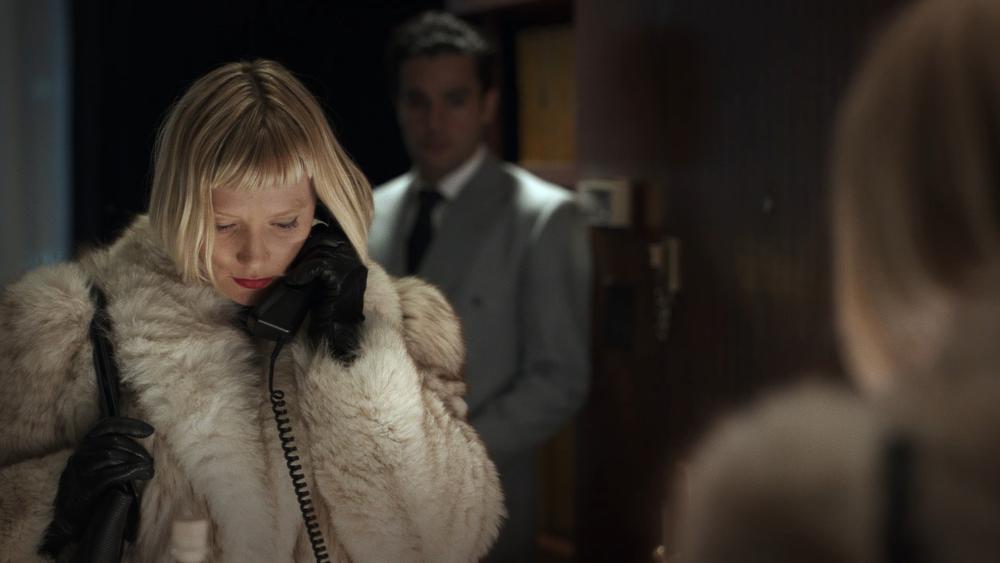As Piercing opens, Reed (Christopher Abbott) is a man with murder on his mind. About 30, nondescript, slightly schlubby even, with a receding hairline, five-o-clock shadow, and a troubled, unsure demeanor, Reed is first seen hovering over his infant daughter with an ice pick in hand. He’s not making a cocktail. Riddled with anxiety and insomnia, Reed is a wreck. His work isn’t fulfilling him. His wife can’t calm him. And then at one point, as he gazes down into the dark pools that are his daughter’s eyes, the infant speaks to him: “You know what you have to do, right?” The moment is chilling, yet absurd. In a very dark way, it’s hilarious. And with that, Piercing is off to the races.
Based on a short novel by Ryu Murakami — also the author of Audition, memorably filmed by Takashi Miike — and adapted for the screen by director Nicolas Pesce, Piercing moves quickly and plays more like an extended vignette than a feature film. Reed explains the rules — his rules — in a voiceover as he packs a simple, S&M-themed murder kit into a getaway bag. His victim must be a prostitute, and she must speak English. No, he doesn’t tell us why this is the case. Nonetheless, his destination is a posh hotel room where he plans to hire a prostitute versed in S&M, tie her up, and then stab her repeatedly until dead. Gallows humor is the dominant mode as Reed, with all the assiduousness of a traveling salesman memorizing a presentation sync’d to his Powerpoint deck, rehearses the different stages of his imagined crime as “The Girl from Ipanema” plays in the background. Abbott plays Reed as insecure but committed; he studies his plans so carefully because he knows he’s out of his element. It’s a risk. What’s unsettling is that he doesn’t anticipate taking any pleasure in the killing. What’s spooky is that he seems to believe he has no choice in the matter.
Dark premise thus established, Piercing takes a hard turn, abandoning Reed in his hotel room and turning its attention instead to sex worker Jackie (Mia Wasikowska), who rolls out of bed as her boss barks at her on an answering machine message about her next client. Jackie makes some coffee, pops some pills, and gets in a taxi. And that’s where Piercing gets interesting, as it starts to become clear that the film considers Reed and Jackie rivals rather than simply predator and prey. Pesce himself seems giddy at the prospect of these two characters meeting, bringing the two of them together in the frame via split-screen before they meet, and cranking up Goblin’s urgent, main title theme for Dario Argento’s Deep Red. It’s a threat, or a promise.
Richly colored though it may be, Piercing is more full of shadows than light, keeping the picture almost as moody as Pesce’s previous, black-and-white The Eyes of My Mother. Cinematographer Zach Galler manages to pour light just where he wants it while spilling little anywhere else. The dark, contrasty imagery complements increasingly uncomfortable action on-screen, as Piercing settles into an entertainingly twisted groove and a compelling rhythm of give and take. The only trouble is there’s not much to grab onto here. Many of the film’s exterior cityscape shots employ what are clearly miniature buildings with row after row of tiny windows, representing huge apartment blocks. The suggestion is that Piercing‘s scenario is a kind of microcosm of larger human relations and interactions, the kind of story you might see told if you peeped through one of those windows at random. That’s true enough, as far as it goes, but Piercing is all about two characters who, strangely, become more opaque as the film progresses. Reed gets a backstory, hinted at in flashbacks, that posits his victim status rather than garden-variety misogyny but doesn’t generate much in the way of empathy in itself. And Abbott is good in the role, both vulnerable and pathetic, even though Reed remains difficult to read. On the other hand, Wasikowska’s performance is a real showcase. Lithe and girlish, she exudes a playfulness that dissonates with the film’s grimmer proceedings. But in her first scene together with Reed, where she tries to gently coax him out of his shell by asking him about his sexual history, offering to masturbate for him, and promising to teach him a thing or two, Jackie comes off as such a fundamentally good egg — kind, generous, open — that you hate to imagine anything bad happening to her. Inasmuch as Piercing has stakes, that’s where you’ll find them.

